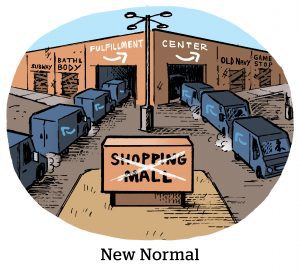Melissa Burdick will be speaking at AdExchanger’s Programmatic IO conference on Sept. 26–27 in New York. Click here to register.
The commerce media market is growing, and so is the role that automated technology plays.
Pacvue, which bills itself as a “commerce acceleration platform,” gives brands a bird’s-eye view of their business’s performance, according to President and Co-Founder Melissa Burdick. That includes stepping in with automated insights to ensure campaigns run smoothly.
For example, sometimes a brand’s Buy Box, which Amazon now calls “Featured Offer,” isn’t working properly. That’s the little window that appears at the top right of product pages above the Buy Now and Add to Cart buttons, which now also includes recommendations for other items customers can buy.
Pacvue can automatically tell when there’s an issue with that feature and share advice on how to fix the problem.
The tech can also be proactive. “When your item falls off of Amazon, we can automatically detect that and cut a ticket to Amazon,” said Burdick, who spent a decade at Amazon before co-founding Pacvue in 2017.
She helped launch Amazon’s “consumables” business, including CPG, health and beauty retail, and worked on Amazon Ads in its tadpole stage. “I was there at Amazon when they created the sponsored product – the UI and the native tools,” Burdick said.
Pacvue scored big when it became one of the first partners to integrate with the API for Amazon’s advertising platform before being acquired by ecommerce software company Assembly in 2021.
“We hook into Amazon, Instacart, Walmart, Target and other retailers, so we’re unifying all these sources of data through API access in one place,” Burdick said. The same goes for retail media. Instead of logging into 40 retail media platforms, clients can see metrics and reporting “that looks the same across retailers.”
Pacvue’s clients include Duracell, Keurig, Unilever and Johnson & Johnson.
Burdick spoke with AdExchanger.
AdExchanger: How can companies use AI to support their commerce initiatives?
MELISSA BURDICK: Retailers, brands, tool providers – everybody is now converging in the [AI technology] space. Today, it’s a lot of test and learn. How do we use this technology? Nobody has answers, because it’s so new.
For example, brands can produce product detail pages, imagery and creatives quickly, but the hardest challenge is making sure their brand equity is represented well. They can’t control the ecosystem of people creating things and using their logos without their permission. How do they make sure they aren’t being portrayed in a way they don’t want?
But AI is going to accelerate the manual work people are doing. Machines can ingest data, analyze it and spit out optimization opportunities to make a human’s job easier.
How is Pacvue using AI?
We’ve adopted the OpenAI plugin and we’re doing a natural language model that can draw conclusions and make associations to provide the right recommendations for you. You can say, “Show me my highest-performing campaigns last week,” and then it pops up an Excel doc for you. Or you can say, “Create a quarterly business review for me,” and it creates a PowerPoint.
We can also generate a product detail page for you based on information you supply, and we’re working on creatives. One of the challenges in this space is generating all the assets for different websites, because they aren’t all standard sizes. We can help brands with that because we unify their retail media.
Where does AI fall short and what pitfalls should commerce companies be aware of?
One of the big limitations is public versus private access to these APIs. Adopting open-source product APIs exposes your private information publicly. There is no solve for protecting the security of internal data and getting access to the functionality you want while also making sure that none of it is leaking out to your competitors.
Changing gears, who will win the grocery wars in the years ahead?
Walmart is best suited. Amazon has struggled with Whole Foods and their model around grocery. Target has a grocery business, but it’s not like you’re going to Target to buy groceries.
What’s good about the grocery wars is that they drive innovation. Amazon’s doing walk-out technology at baseball games, where you can walk in, grab a water and walk out. Amazon can’t win everywhere, but they could potentially win in places that are very high margin, like baseball parks and airports.
What predictions do you have for the retail media space in general?
Everyone has a retail media network, but it’s not like brands have more money now – they don’t. There can’t be 100 winners. There will be a few winners, while the rest of the longtail needs to be consolidated in more of a programmatic way.
This interview has been edited and condensed.
For more articles featuring Melissa Burdick, click here.





















